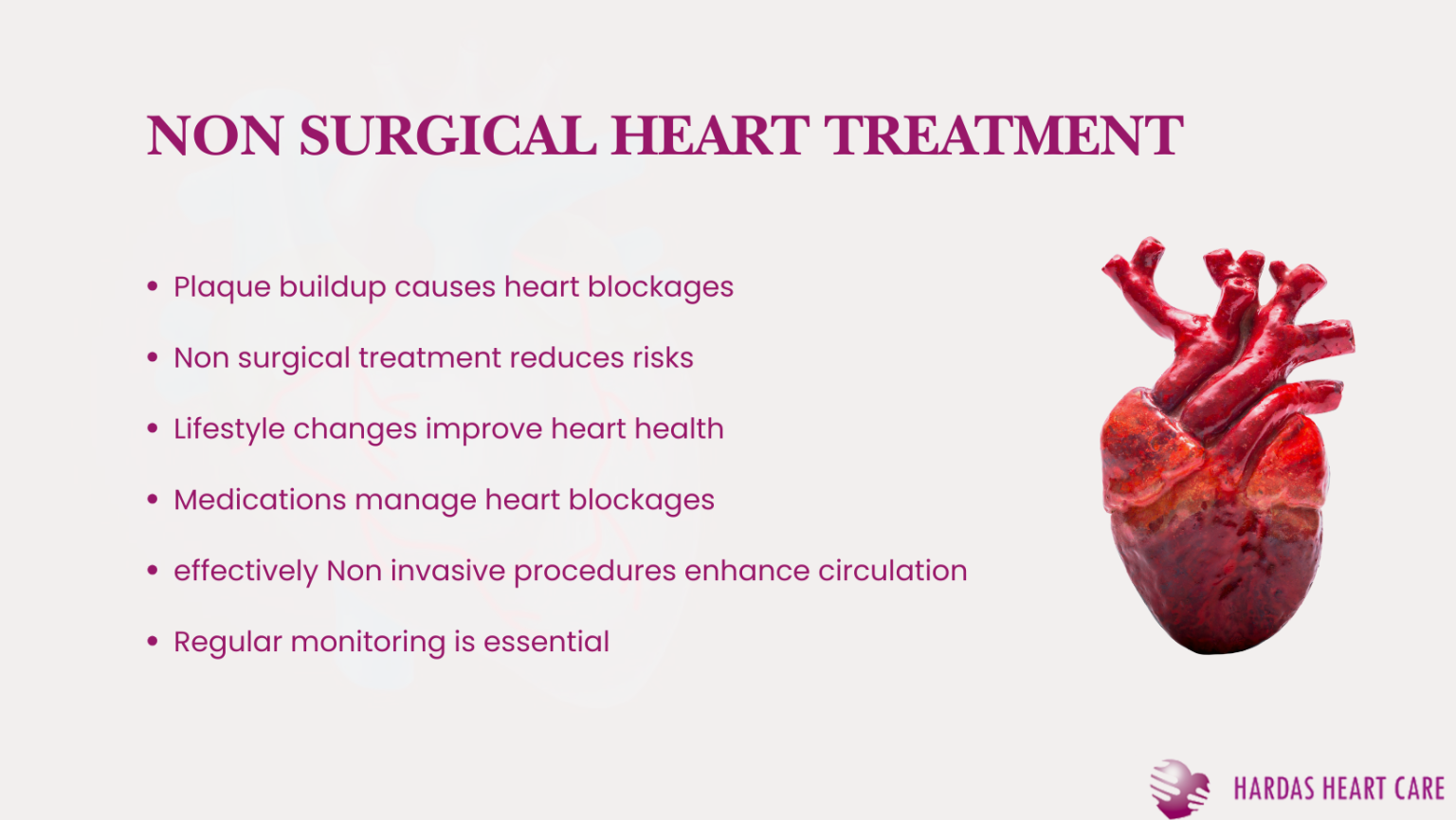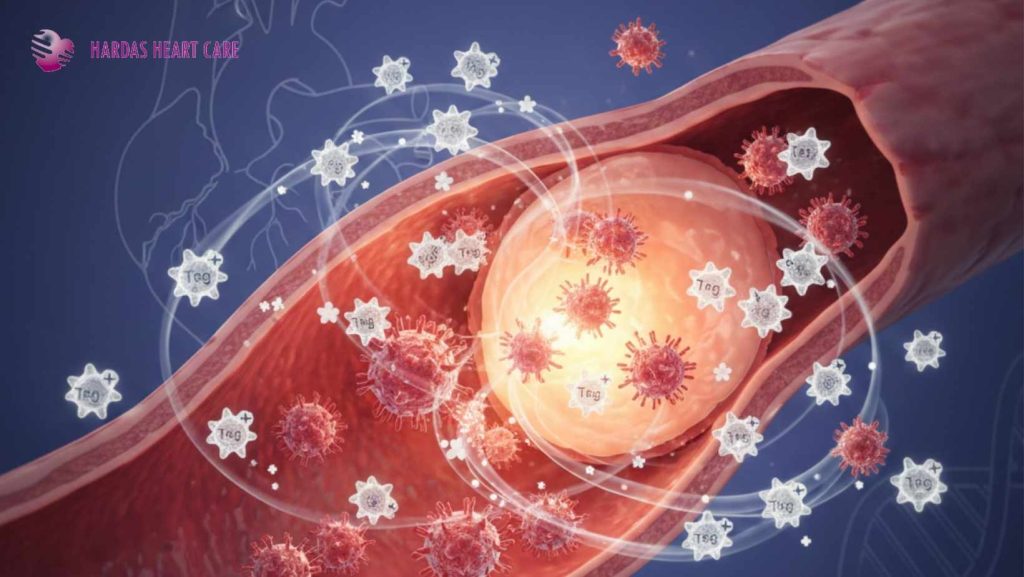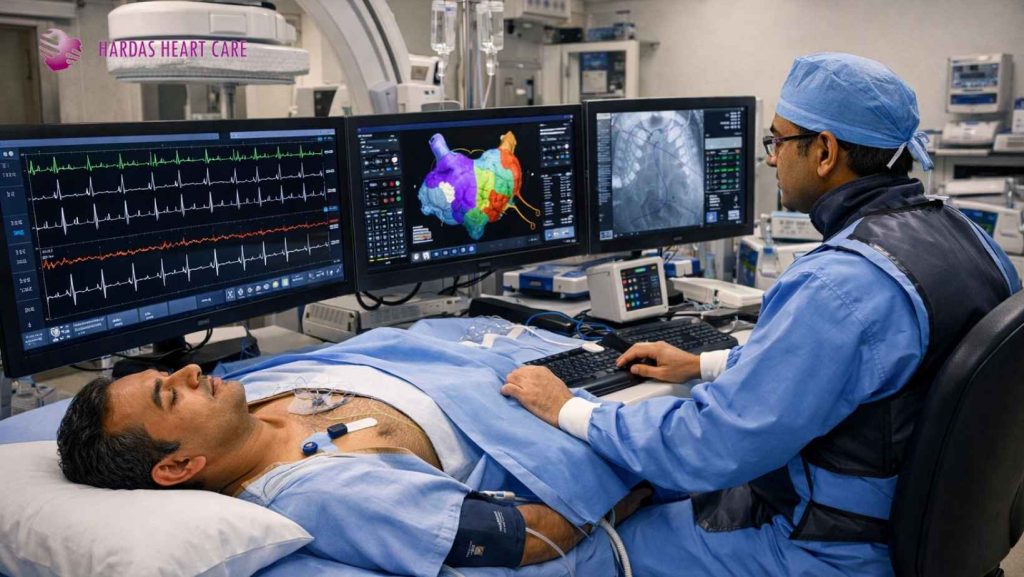When the heart’s blood vessels become narrowed or blocked, many people immediately think of invasive surgeries: bypass grafts, angioplasty with stents, or open‑chest procedures. But what if there was a way to restore blood flow, relieve symptoms, and revive heart performance—without scalpel or catheter? In Pune, the field of non surgical heart treatment in Pune is gaining momentum, offering patients new hope and fewer risks. In this blog, we delve into what non surgical heart treatment in Pune really means, how it works, which patients are candidates, and why Dr. Suhas Hardas is emerging as a trusted name in this domain.
Non‑Surgical Heart Treatment
Heart disease remains one of India’s leading health challenges. Many patients with coronary artery disease endure frequent chest pain (angina), shortness of breath, fatigue, or even silent ischemia (reduced blood flow without obvious symptoms). Traditional treatments span from medications and lifestyle change to invasive procedures like stenting or bypass. But in recent years, medical technology has introduced non surgical heart treatment in Pune as a compelling middle ground—treatments that can improve circulation, stimulate new vessel growth, and alleviate symptoms without cutting open the chest or threading catheters into coronary arteries.
Using techniques such as shockwave therapy, external cardiac stimulation, enhanced external counterpulsation (EECP), stem cell–based therapies, and novel angiogenic (blood vessel–growing) treatments, non surgical heart care aims to repair and remodel the heart’s microcirculation. These therapies can complement medications, reduce the need for more invasive interventions, and offer patients safer alternatives with shorter recovery times.
In Pune, a city with world‑class cardiac centers, non surgical heart treatment in Pune is now offered by leading cardiologists who combine deep clinical experience with forward‑looking approaches. Among them, Dr. Suhas Hardas has been at the forefront of integrating modern, evidence‑based non‑invasive cardiac therapies into real clinical practice.
Understanding the Mechanisms: How Non Surgical Heart Treatments Work
To appreciate the power of non surgical heart treatment in Pune, it helps to understand the underlying biological principles. Instead of mechanically forcing open blocked vessels (as in stents or bypass), non surgical therapies aim to harness the body’s own repair and remodeling capacities. Here are key mechanisms:
1. Angiogenesis and Neovascularization
One central objective is to stimulate angiogenesis—the growth of new, small blood vessels in ischemic (low‑blood supply) areas of the heart. By applying controlled physical or biochemical stimuli, the tissues are coaxed to sprout capillaries and collateral vessels that bypass the blocked region. Over time, this new network can supply sufficient blood to relieve symptoms.
2. Shear Stress & Mechanical Stimulation
Certain therapies use sound waves or mechanical pulses to create micro‑shear forces on endothelial cells (lining of blood vessels), stimulating gene expression that promotes vascular growth. For example, shockwave or acoustic wave therapy applies focused pulses externally to target ischemic zones. The microtrauma stimulates reparative cascades, inducing vascular endothelial growth factor (VEGF) and other pro‑angiogenic signals.
3. Enhanced Blood Flow Dynamics
Another class of non surgical heart treatment in Pune is enhanced external counterpulsation (EECP). In EECP, cuffs are wrapped around the legs and synchronized with the cardiac cycle to augment diastolic blood pressure (when the heart relaxes) and increase coronary perfusion. The improved hemodynamics can reduce workload on the heart and promote better microcirculation.
4. Stem Cell & Biological Therapies
In some advanced centers, autologous stem cell injections or growth factor infusions are combined with non‑invasive stimulation to guide stem cells into ischemic tissue. The idea is to deliver reparative cells that secrete angiogenic factors, facilitate tissue repair, reduce inflammation, and encourage new vessel formation.
5. Remodeling & Collateral Recruitment
Even existing but dormant collateral vessels may be coaxed to enlarge under proper stimuli, providing alternative pathways for blood flow. Non surgical interventions can create conditions that favor the remodeling and expansion of collateral networks.
Together, these mechanisms offer a comprehensive, holistic approach to non surgical heart treatment in Pune—less about cutting and more about guiding, awakening, and supporting natural healing.
Why Choose Non Surgical Treatment?
- Patients often ask: Why not directly go for stents or bypass? The answer lies in risk, recovery, and long-term strategy. Here are compelling reasons to consider non surgical heart treatment in Pune:
- Lower risk profile. Avoiding incisions, anesthesia, and major vascular access reduces risks such as bleeding, infection, stroke, or trauma to the arteries.
- No need for hospital stay. Many non surgical procedures can be done on an outpatient basis, or with minimal observation.
- Repeatability. If needed, non surgical treatments can often be repeated or combined with other therapies without precluding future interventions.
Complementary to medical therapy. These approaches work in harmony with drugs, lifestyle changes, and conventional care.
Gentler recovery. Patients typically experience less pain, faster return to normal activity, and fewer post‑procedure complications.
Access to patients not eligible for surgery. Some individuals, due to comorbidities (e.g. severe lung disease or frailty), may not be surgical candidates. Non surgical options expand possibilities.
In Pune especially, where many patients seek advanced care but are wary of invasive procedures, non surgical heart treatment in Pune is an appealing alternative. Under a skilled cardiologist’s supervision, these treatments can achieve meaningful symptomatic relief, improved exercise capacity, and better quality of life.
What Types of Patients Benefit?
Non surgical therapies are not universal cures; careful patient selection is crucial. Typical candidates for non surgical heart treatment in Pune include:
- Those with chronic stable angina refractory to medical therapy but who either refuse or are unsuitable for invasive interventions.
- Individuals with diffuse coronary disease (multiple small vessel blockages) where stents or grafts may not reach.
- Patients with recurrent symptoms despite prior interventions, where further stenting or bypass is risky or unlikely.
- Those with microvascular disease or endothelial dysfunction (small vessel disease) where traditional angioplasty is ineffective.
- Professionals or elderly patients wanting less disruption and faster recovery.
Before recommending treatment, a cardiologist performs detailed investigations—stress imaging, perfusion scans, coronary angiogram (to map anatomy), CT angiography, echocardiography, biochemical markers, and functional capacity tests. Based on the findings, a personalized plan for non surgical heart treatment in Pune is crafted.
The Non Surgical Heart Treatment Journey: Patient Experience
Let us walk through a typical patient’s journey undergoing non surgical therapy in Pune under an expert like Dr. Suhas Hardas:
Initial Consultation & Evaluation
At the first meeting, Dr. Hardas (or his team) collects medical history, risk factors (hypertension, diabetes, cholesterol), symptom profile, prior treatments, and comorbidities. Next, they schedule appropriate tests to characterize the heart’s blood supply, ejection fraction, ischemic zones, and coronary anatomy.
Treatment Planning
Based on investigations, a treatment plan is drawn. Suppose certain segments are identified as ischemic but not amenable to stenting; non surgical modalities are designed to target those zones. The plan may combine shockwave therapy, EECP, and stem cell infusion.
Therapy Sessions
Each therapy session is scheduled over weeks, often in multiple sessions. For example, shockwave applications might last 20–30 minutes per session, carefully localized over the chest. EECP sessions may last an hour or more, typically daily for several weeks. Stem cell administration is done under sterile, controlled settings.
During therapy, patients lie comfortably while devices deliver pulses or stimulation. They may feel light tingling or pressure but rarely pain. Vital signs are continuously monitored. The patient is encouraged to stay relaxed and follow breathing instructions if needed.
Monitoring & Adjustment
Throughout the course, the cardiologist tracks progress via clinical symptoms (angina frequency, breathlessness), exercise tests, and imaging (stress scans, perfusion imaging). Adjustments may be made: altering session dosage, changing focus zones, combining treatments, or repeating cycles.
Outcome & Follow‑Up
Over weeks to months, gradual improvements may emerge: reduced chest discomfort, increased walking distance, fewer medications, and better quality of life. Imaging may show improved perfusion in previously ischemic segments. The plan is periodically reviewed to maintain gains and prevent regression.
Throughout this journey, patients are counseled on lifestyle modification (diet, exercise, smoking cessation) and on continuing medical therapy (antiplatelets, statins, beta‑blockers, etc.). Non surgical care is not replaced but augmented.
Dr. Suhas Hardas: A Trusted Name in Pune Cardiology
When embarking on a path of non surgical heart treatment in Pune, the physician guiding that journey matters deeply. Dr. Suhas Hardas has earned acclaim for his patient‑centric approach, combining rigorous clinical training with openness to innovation. He has treated numerous cardiac patients in Pune, always emphasizing safety, accountability, and evidence.
Under his mentorship, non surgical therapies are delivered with precision, guided by imaging and patient feedback, rather than as one‑size‑fits‑all protocols. Dr. Hardas ensures that every candidate is evaluated candidly—if invasive intervention is clearly superior, he does not oversell non surgical options. His aim is clear: deliver the best therapy for each patient, surgical or otherwise.
Mentioning his name instills trust among local patients in Pune who are exploring cutting‑edge therapies. With him at the helm, non surgical heart treatment in Pune gains credibility, compassion, and clinical integrity.
Evidence & Scientific Support
It’s natural to ask: how much of this is proven, and how much is experimental? The answer: some modalities are well studied; others are newer and still under investigation. But here’s a snapshot of current evidence:
- Shockwave / acoustic wave therapy in ischemic heart disease has been explored in clinical pilot studies showing improved perfusion and symptom relief in patients with refractory angina.
- EECP has been rigorously studied for stable angina and heart failure; randomized trials show modest improvement in angina class, exercise tolerance, and quality of life.
- Stem cell therapies remain in research phases; meta‑analyses reveal potential benefits in select patients but also emphasize variability and need for standardization.
- Combined approaches (e.g. mechanical stimulation + biological therapy) are under active clinical investigation, with promising preliminary results.
In sum, non surgical heart treatment in Pune is not a miracle cure, but an evolving armamentarium grounded in physiology, translational research, and patient experience. With responsible use and careful patient selection, many patients gain real benefit.
Challenges, Risks & Limitations
No therapy is without caveats. When considering non surgical heart treatment in Pune, patients must understand:
- Variability of response. Some patients respond well, others modestly, and some not at all. Predicting responders is still imperfect.
- Time to benefit. Improvement often happens over weeks to months, not immediately.
- Adjunct, not replacement. These treatments often augment—not totally replace—medications or standard therapies.
- Cost & access. Newer therapies may be more expensive, less widely available, and not always covered by insurance.
- Need for expertise. Poor targeting or misapplication may yield little benefit; success depends heavily on clinician skill.
- Limited long‑term data. For certain modalities (especially stem cell or advanced angiogenic therapy), long-term durability is not fully established.
For these reasons, non surgical heart treatment in Pune must be offered with transparency, clear consent, and realistic expectations.
How to Choose the Right Center or Doctor
If you are in or near Pune and considering non surgical heart treatment, here are qualities to look for:
- Reputation & clinical experience. A cardiologist familiar with non surgical cardiac therapies (like Dr. Suhas Hardas) is preferable.
- Imaging & monitoring facilities. Ability to localize ischemia, track perfusion, and monitor outcomes.
- Combined modalities. Centres that offer multiple non surgical options (shockwave, EECP, cell therapy) can customize plans.
- Clear selection criteria. Honest explanation of who is a candidate, with documented criteria.
- Follow‑up support. Rehabilitation, lifestyle counselling, long-term monitoring, and readiness to switch to other options if needed.
- Patient feedback & outcomes. Testimonials, published results, or case studies can provide confidence (with caution about bias).
- Ethics & transparency. Providers should present potential benefits, costs, risks, and alternatives without overpromising.
If the name Dr. Suhas Hardas appears as a key practitioner, you can inquire about his track record, patient outcomes, and protocols in non surgical heart treatment in Pune.
Frequently Asked Questions (FAQ)
Q1: What exactly is non surgical heart treatment?
A: It refers to therapies that improve myocardial (heart muscle) perfusion, stimulate vessel growth, or enhance microcirculation without open‑chest surgery or catheter-based stenting. Techniques may include shockwave therapy, EECP, stem cell/angiogenic therapy, or mechanical stimulation applied externally.
Q2: Is non surgical heart treatment safe?
A: Generally, yes, when performed by experienced cardiologists in appropriate patients. Risks are lower than invasive procedures, but careful screening, planning, and monitoring are essential.
Q3: How many sessions are required?
A: It varies. Some protocols require 6–12 weeks of repeated sessions (often daily or several times per week). Others may involve 8–10 shockwave sessions over several weeks.
Q4: When can I expect improvement?
A: Symptom relief often emerges gradually—in some patients within 4–6 weeks, but maximal benefit may take 3–6 months or longer.
Q5: Can it replace stenting or bypass altogether?
A: Not always. In many cases, non surgical treatments complement conventional therapies.
If a critical artery shows severe blockage and causes symptoms, doctors may still recommend stenting or surgery.
Q6: Who is a good candidate?
A: Patients with stable angina not fully relieved by medications, those unsuitable for surgery due to comorbidities, diffuse small‑vessel disease, or recurrent symptoms despite prior interventions.
Q7: Are there long‑term results available?
A: For some modalities like EECP, long‑term follow-up supports sustained benefit in angina relief. For newer therapies (stem cell, advanced shockwave), long-term durability is still under study.
Q8: Does insurance cover non surgical heart treatment in Pune?
A: Coverage is variable. As these are relatively novel therapies, many insurers may classify them as investigational. Always check with your provider before treatment.
Q9: What should I ask the cardiologist offering this treatment?
A: Ask about their experience, success rates, risks, monitoring protocols, imaging methods, alternative options, and cost breakdown. Request published case data if available.
Q10: How can I maintain results long term?
A: Continuation of heart‑healthy lifestyle (diet, exercise, smoking cessation), adherence to medications, regular follow-up imaging, and possibly booster sessions of non surgical therapies.
Conclusion
The rise of non surgical heart treatment in Pune heralds a transformative shift in cardiac care—treatments that empower the body’s own capacity for repair rather than relying purely on mechanical intervention. Under the stewardship of experienced cardiologists like Dr. Suhas Hardas, these modalities may offer safer, gentler, and more patient‑friendly alternatives for those battling coronary disease.
If you or a loved one in Pune is facing angina, blocked vessels, or declining heart function but wish to avoid open surgery, exploring non surgical options is both wise and timely. Begin with a detailed consultation, understand the pros and limitations, and proceed under a center that values transparency, precision, and patient welfare.
Whether or not you ultimately choose non surgical treatment, the very journey of informed decision‑making brings you closer to the best possible outcome. In the future, as research advances and evidence accumulates, non surgical heart treatment in Pune may well become a mainstream, first‑line option in cardiac care—especially in the hands of compassionate, skilled physicians like Dr. Suhas Hardas.



